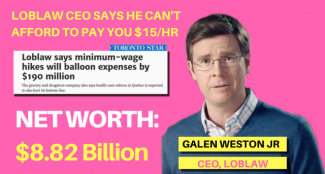ALTOGETHER ELSEWHERE...
Or, let’s not forget what happened while we were all hanging on by our fingertips


BILLIONAIRES GOT BURIED IN MONEY. That’s what happened. Silently. All without even trying. The money drifted in. Ankle-deep. Knee-deep. Hip-deep.
Canadian billionaires added $78 billion to their total wealth by the end of the first year of the pandemic—an increase of almost 70% in just 12 months!
It is a staggering amount. Hard to even imagine when our lives revolve around mortgage, rent, car, student loan payments and paycheques in the hundreds.
425 lifetimes
It would take 425 liftetimes of work for the average Canadian to earn $1 billion. But many of our billionaires added much more than a billion to their fortunes in just one short year, from March 2020 to April in 2021. The top six include:
-
David Thomson and family (Winnipeg Jets) added $14.4 billion (6,120 lifetimes)
-
Tobi Lutke (Shopify) added $8.8 billion (3,740 lifetimes)
-
Jim Pattison, “Canada’s Warren Buffett” from B.C added $7.2 billion (3,060 lifetimes)
-
Anthony von Mandl (Mike’s Hard Lemonade) added $6.8 billion (2,890 lifetimes)
-
David Cheriton(Google) added $4.9 billion (2,082 lifetimes)
-
Galen Weston and family (Loblaws) added $4.5 billion (1,912 lifetimes)
4,448 times more wealth
The Canadian Centre for Policy Alternatives (CCPA) has published research showing that Canada’s 87 richest families each hold, on average, 4,448 times more wealth than the typical family. Together these 87 families hold more wealth than the bottom 12 million Canadians combined.
These levels of inequality and concentration of wealth among billionaires are not inevitable. A range of policy tools are available to rein in extreme inequality, while simultaneously raising revenue for sustained, long-term public investment in key areas after the pandemic.
How about a Wealth tax
One policy to help achieve this is a wealth tax on the super rich. CCPA recent research shows that a wealth tax in Canada would raise even more revenue than previously expected. A 1% annual tax on wealth over $20 million would raise approximately $10 billion in revenue per year, and a moderately more ambitious wealth tax could raise nearly $20 billion per year.
A wealth tax of this kind would only apply to the richest of the rich: the wealthiest 0.2% of Canadians. Together, these 25,000 households currently control $1.8 trillion of the country’s wealth.
There is enormous public support for a wealth tax. More and more research from leading experts tells us that a wealth tax can be designed and enforced effectively—no matter how slippery the rich are. What’s been missing is the political will, not the technical or economic means to create a wealth tax and make it stick.
Existing elements of the tax system can also be enforced much more effectively if only governments were motivated—or compelled by social movements—to take on the wealthy few.
If only...
But governments are not motivated. There are no vast, unified social movements on the rise. Not yet. But there are massive tectonic plates of influence and pressure in society just as much as there are in geology. We can be convinced to pretend they don’t exist. But all the pretending in the world will not keep us from the inevitable consequences.
Not paying attention offers no protection from what will be, as W.H. Auden reminded us in his poem “The Fall of Rome”
Altogether elsewhere, vast
Herds of reindeer move across
Miles and miles of golden moss,
Silently and very fast.
- 30 -













Add new comment